I’m always looking for new works to review for Because My Tears Are Delicious To You, an ongoing series on my own website. There I revisit some of the books I loved as a teen. Recently I put out a request on social media for readers to suggest authors and works now obscure that deserve mention. To my surprise, someone suggested Arthur C. Clarke’s Tales from the White Hart.
…How on Earth could Tales from the White Hart be considered obscure? Well…for one thing, the author has been dead for over a decade. The collection is an astounding ten twenty thirty forty fifty sixty-three years old, which is to say it’s as ancient to a new SF reader in 2020 as H. G. Wells’ The Time Machine was for the new SF reader in 1957, when Tales first came out.
Tales from the White Hart is also an example of a genre once popular that seems to have fallen into comparative obscurity: the barroom tale. The genre assumes a beloved old bar filled with regulars, one or more of whom is a talented raconteur. It’s a form made to order for SF magazines, the publications that once ruled the SF world. It’s also a form easily anthologized, as it was in Tales. As it also was for several other series of bar stories. Settle down, my friends, and nurse your beers or non-alcoholic beverages as I tell you of bar tale collections of the past…
Tales from the White Hart by Arthur C. Clarke
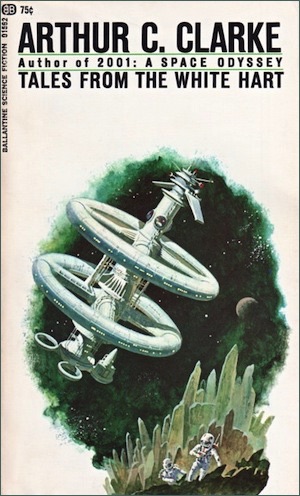
Set in the eponymous White Hart, this short collection features Harry Purvis, who tells quick tales that are entertaining enough to forestall rude questions about scientific plausibility (from a bar audience populated by thinly disguised versions of Britain’s best-known post-war SF authors). From death rays to man-eating-plants—if Harry hadn’t personally encountered a trope himself, he knew someone who had.
***
Tales From Gavagan’s Bar by L. Sprague de Camp and Fletcher Pratt (with illustrations by Inga Pratt, at least in my edition)
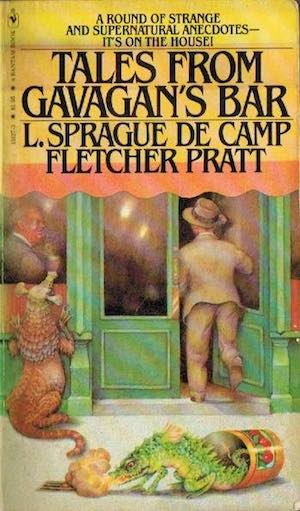
Of similar vintage to the White Hart tales, the Gavagan’s stories feature a broader cast of storytellers, each of whom is tells about an encounter with the weird, implausible, or divine. The stories barely count as short…any shorter and they would be Fredric Brown-style short shorts for which the postage needed to submit them would be more than the price paid by any magazine. Some are forgettable, but their brevity means that another story will be along soon enough. Enough of those are entertaining to make this collection worth a read.
***
Callahan’s Crosstime Saloon by Spider Robinson
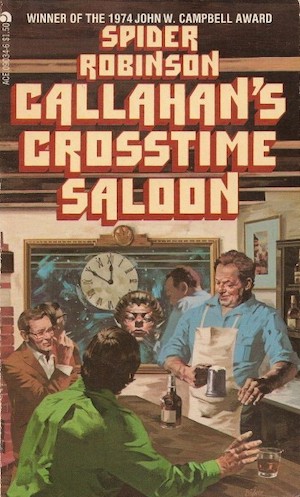
Initially set in a bar somewhere on Long Island, Callahan’s attracts a cross section of society’s damaged souls, most of them masculine, who are seeking solace in alcohol and the company of others. A curious variety of new customers arrive and tell their stories, including ethically conflicted robots, time travellers, doomed telepaths, and others. Widower Jake Stonebender relates the various tales told by these weird visitors.
***
The Draco Tavern by Larry Niven
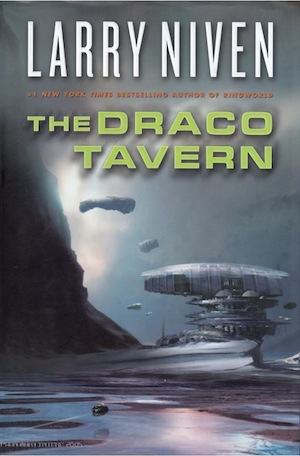
For the star-faring Chirpsithra, Earth is just another unremarkable world, a good place to visit but not to live. For Rick Schumann, owner/bartender of the Draco Tavern, the Chirpsithra and the other aliens who accompany them are his customers. As Rick’s tales reveal, these customers are an endless source of complications, of the sort of which stories are made.
***
All of the above collections are somewhat…let’s say vintage. This is not to say the genre is entirely defunct. There are modern examples, one of which is currently sitting in my in-box, not yet read.
Fables From the Fountain (2020) edited by Ian Whates
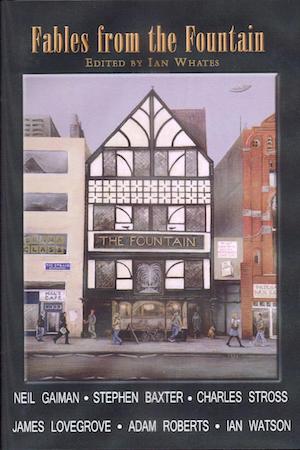
This anthology was intended as a homage to Tales from the White Hart. Editor Whates has recruited a roster of British SF authors, who have tried their hands at this venerable subgenre. I am curious what modern authors make of it.
***
No doubt many of you (pointed look at the Lord Dunsany fans) are astounded that I missed one or more of your favourites. The comments are, as ever, below.
In the words of Wikipedia editor TexasAndroid, prolific book reviewer and perennial Darwin Award nominee James Davis Nicoll is of “questionable notability.” His work has appeared in Publishers Weekly and Romantic Times as well as on his own websites, James Nicoll Reviews and Young People Read Old SFF (where he is assisted by editor Karen Lofstrom and web person Adrienne L. Travis). He is a four-time finalist for the Best Fan Writer Hugo Award and is surprisingly flammable.










